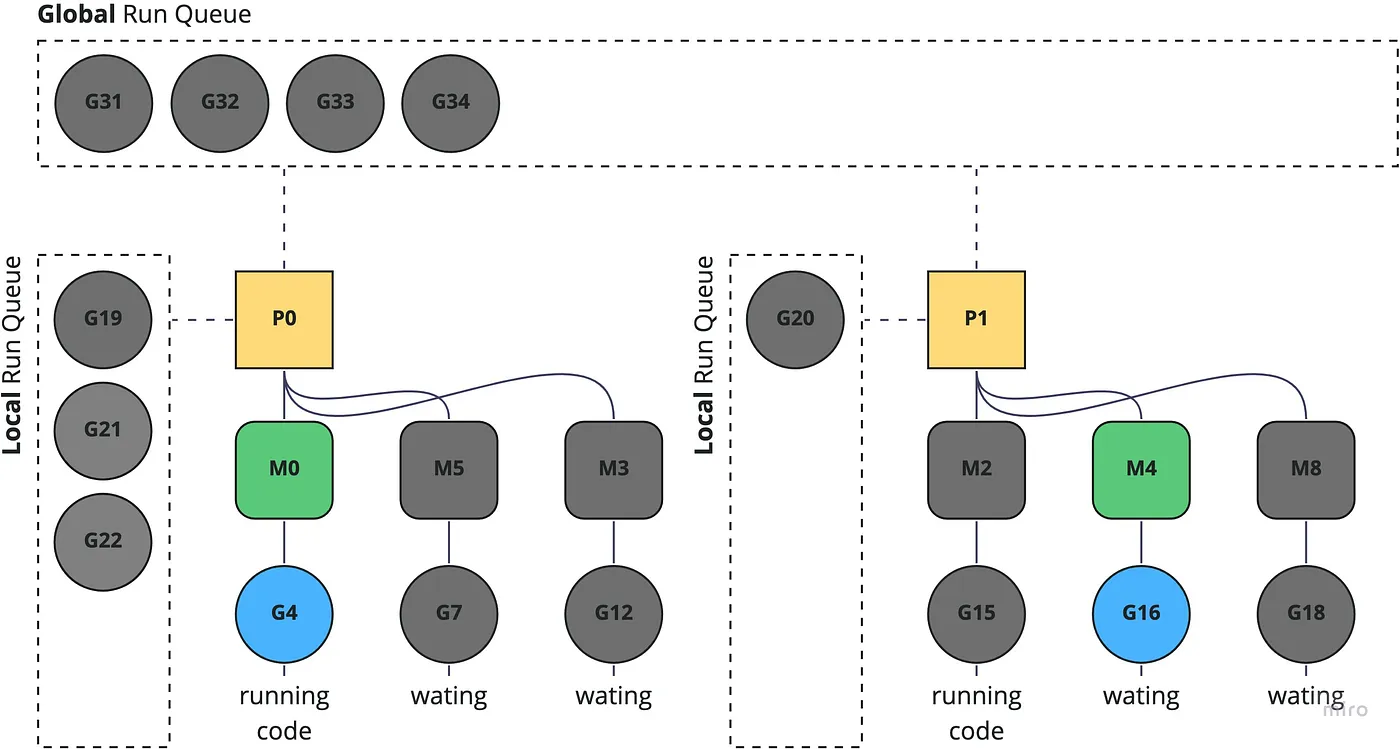前言
第一次接触golang是16年左右,在腾讯云做COS服务时期。后来随着K8S和虚拟币的持续火爆,golang也最终进入大部分程序员的视野。
golang是Ken Thompson(Unix&C的主程)在google工作时写的,前身是其编写的实验性语言C-。golang的编译器最开始是C语言写的,后来用golang重写了。和C++以繁杂晦涩著称的学术性规范不同,golang是一门非常工程化的语言。
https://go.dev/ref/spec
可以粗暴的理解为golang = struct + interface + coroutine + gc。这里简单对比一下golang和C以及其他高级语言的差异。
常见语法
所有关键字只有25个,这在高级语言里是很克制的。对比c语言有30+个,java有50+,C++有70+。
break default func interface select
case defer go map struct
chan else goto package switch
const fallthrough if range type
continue for import return var
- 类型后置
类型后置应该是劝退新手的第一大因素,感受一下。//变量 var x interface{} // x is nil and has static type interface{} var v *T // v has value nil, static type *T x = 42 // x has value 42 and dynamic type int x = v // x has value (*T)(nil) and dynamic type *T //切片 v = make([]int, 50, 100) x = v[1, 10] //结构 struct { x, y int u float32 _ float32 // padding A *[]int F func() } //通道 x = chan T // can be used to send and receive values of type T x = chan<- float64 // can only be used to send float64s x = <-chan int // can only be used to receive ints //函数 func foo(x int) int func foo(a, b int, z float32) (bool) func foo(int, int, float64) (float64, *[]int) func foo(n int) func(p *T) //方法 func (p T) Read(p []byte) (n int, err error) func (p T) Write(p []byte) (n int, err error) func (p T) Close() error //接口 type Reader interface { Read(p []byte) (n int, err error) Close() error } type Writer interface { Write(p []byte) (n int, err error) Close() error } // ReadWriter's methods are Read, Write, and Close. type ReadWriter interface { Reader // includes methods of Reader in ReadWriter's method set Writer // includes methods of Writer in ReadWriter's method set } - 更简单灵活循环for
没有while关键字,全部靠for -
函数与闭包closure
函数和闭包运行时使用同一个结构funcval。闭包就是带有自由变量的函数。type funcval struct { fn uintptr // variable-size, fn-specific data here } - 接口interface
接口是作用于struct的函数集合。有点类似C++里的vtable,只是golang把他从对象上完全独立出来了。对象可以随时定义新的接口。运行时结构如下:type ITab struct { Inter *InterfaceType Type *Type Hash uint32 // copy of Type.Hash. Used for type switches. Fun [1]uintptr // variable sized. fun[0]==0 means Type does not implement Inter. } type itab = abi.ITab
运行时语义
这内容大部分都在这个文件里src/runtime/runtime2.go
- 协程coroutine
大部分调度设计都有三个角色:调度P,执行者M和例程G,golang也不例外。比如Linux内核中:执行者是cpu,调度是schedule,例程是task;golang和Java的协程结构非常类似:执行者是系统线程,调度是schedule,例程是coroutine;但是golang开启协程非常简单,在任何函数调用前go即可。
go关键字在运行期对应的是newproc,创建一个g放到一个全局队列中等待调度。每个执行者有他自己本地Steal模式的队列。// Create a new g running fn. // Put it on the queue of g's waiting to run. // The compiler turns a go statement into a call to this. func newproc(fn *funcval) { gp := getg() pc := sys.GetCallerPC() systemstack(func() { newg := newproc1(fn, gp, pc, false, waitReasonZero) pp := getg().m.p.ptr() runqput(pp, newg, true) if mainStarted { wakep() } }) }
-
通道channel
如果是一个channel,可以认为是一个FIFO队列的语法糖。但是多个channel配合select,支持类似多路复用的逻辑,威力就大了。var a []int var c, c1, c2, c3, c4 chan int var i1, i2 int select { case i1 = <-c1: print("received ", i1, " from c1\n") case c2 <- i2: print("sent ", i2, " to c2\n") case i3, ok := (<-c3): // same as: i3, ok := <-c3 if ok { print("received ", i3, " from c3\n") } else { print("c3 is closed\n") } case a[f()] = <-c4: // same as: // case t := <-c4 // a[f()] = t default: print("no communication\n") } - 延迟调用defer
在函数执行完成,return之前(严谨一点来说是ret指令)执行的函数。有点类似Java里finally的味道。可以定义多个构成一个列表,后进先出。type _defer struct { heap bool rangefunc bool // true for rangefunc list sp uintptr // sp at time of defer pc uintptr // pc at time of defer fn func() // can be nil for open-coded defers link *_defer // next defer on G; can point to either heap or stack! // If rangefunc is true, *head is the head of the atomic linked list // during a range-over-func execution. head *atomic.Pointer[_defer] } - 错误处理error&panic
type _panic struct { argp unsafe.Pointer // pointer to arguments of deferred call run during panic; cannot move - known to liblink arg any // argument to panic link *_panic // link to earlier panic // startPC and startSP track where _panic.start was called. startPC uintptr startSP unsafe.Pointer // The current stack frame that we're running deferred calls for. sp unsafe.Pointer lr uintptr fp unsafe.Pointer // retpc stores the PC where the panic should jump back to, if the // function last returned by _panic.next() recovers the panic. retpc uintptr // Extra state for handling open-coded defers. deferBitsPtr *uint8 slotsPtr unsafe.Pointer recovered bool // whether this panic has been recovered goexit bool deferreturn bool } - GC
Golang的GC和Java的G1大致相当,STW/可达性分析/mark-sweep/三色标记/读写屏障/并发回收这些都有,但是还没有精细到如ZGC/shenandoah。
工程化
golang对工程化的专注,暴打Java和C++。
- 模块module
go mod init go mod add go mod tidy go mod download go mod graph go list -m all以上go mod命令都是在自动维护一个go.mod文件。
module example/hello go 1.23.4 require rsc.io/quote v1.5.2 require ( golang.org/x/text v0.0.0-20170915032832-14c0d48ead0c // indirect rsc.io/sampler v1.3.0 // indirect ) - 编译build
直接编译成可执行文件,大小和C++的差不多。go build go run
至此,可以去看K8S源码了。
微信扫描下方的二维码阅读本文


0 Comments